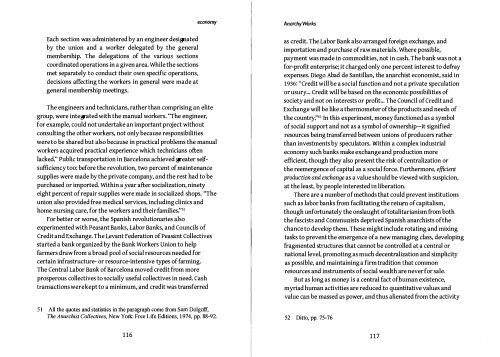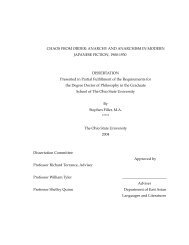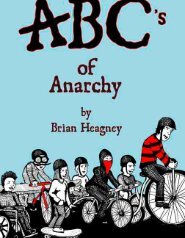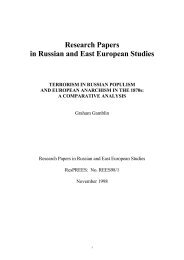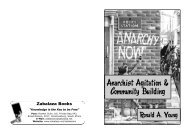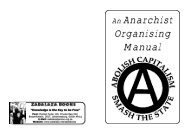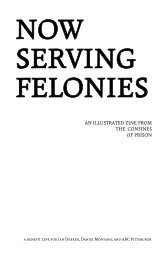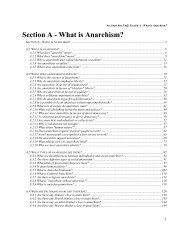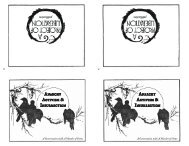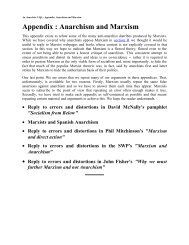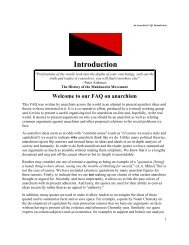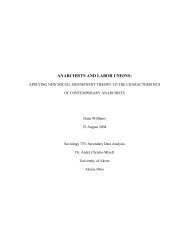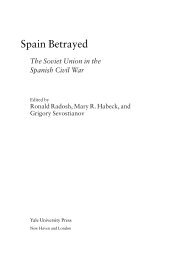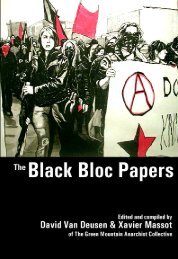Anarchy Works.pdf - Infoshop.org
Anarchy Works.pdf - Infoshop.org
Anarchy Works.pdf - Infoshop.org
Create successful ePaper yourself
Turn your PDF publications into a flip-book with our unique Google optimized e-Paper software.
ecollOmy<br />
Anan::hy <strong>Works</strong><br />
Each section was administered by an engineer designated<br />
by the union and a worker delegated by the general<br />
membership. The delegations of the various sections<br />
coordinated operations in a given area. While the sections<br />
met separately to conduct their own specific operations,<br />
decisions affecting the workers in general were made at<br />
general membership meetings.<br />
The engineers and technicians, rather than comprising an elite<br />
group, were integrated with the manual workers. "The engineer,<br />
for example, could not undertake an important project without<br />
consulting the other workers, not only because responsibilities<br />
were to be shared but also because in practical problems the manual<br />
workers acquired practical experience which technicians often<br />
lacked:' public transportation in Barcelona achieved greater selfsufficiency<br />
too: before the revolution, two percent of maintenance<br />
supplies were made by the private company, and the rest had to be<br />
purchased or imported. Within a year after socialization, ninety<br />
eight percent of repair supplies were made in socialized shops. "The<br />
union also provided free medical services, including clinics and<br />
home nursing care, for the workers and their families:'51<br />
For better or worse, the Spanish revolutionaries also<br />
experimented with Peasant Banks, Labor Banks, and Councils of<br />
Credit and Exchange. The Levant Federation of Peasant Collectives<br />
started a bank <strong>org</strong>anized by the Bank Workers Union to help<br />
farmers draw from a broad pool of social resources needed for<br />
certain infrastructure- or resource-intensive types of farming.<br />
The Central Labor Bank of Barcelona moved credit from more<br />
prosperous collectives to socially useful collectives in need. Cash<br />
transactions were kept to a minimum, and credit was transferred<br />
51 All the quotes and statistics in the paragraph come from Sam Dolgofl',<br />
The Anarchist Collectives, New York: Free Life Editions, 1974, pp. 88-92.<br />
as credit. The Labor Bank also arranged foreign exchange, and<br />
importation and purchase of raw materials. Where possible,<br />
payment was made in commodities, not in cash. The bank was not a<br />
for-profit enterprise; it charged only one percent interest to defray<br />
expenses. Diego Abad de Santillan, the anarchist economist, said in<br />
1936: "Credit will be a social function and not a private speculation<br />
or usury ... Credit will be based on the economic possibilities of<br />
society and not on interests or profit... The Council of Credit and<br />
Exchange will be like a thermometer of the products and needs of<br />
the country:'5Z In this experiment, money functioned as a symbol<br />
of social support and not as a symbol of ownership-it signified<br />
resources being transferred between unions of producers rather<br />
than investments by speculators. Within a complex industrial<br />
economy such banks make exchange and production more<br />
efficient, though they also present the risk of centralization or<br />
the reemergence of capital as a social force. Furthermore, efficient<br />
production and exchange as a value should be viewed with suspicion,<br />
at the least, by people interested in liberation.<br />
There are a number of methods that could prevent institutions<br />
such as labor banks from facilitating the return of capitalism,<br />
though unfortunately the onslaught of totalitarianism from both<br />
the fascists and Communists deprived Spanish anarchists of the<br />
chance to develop them. These might include rotating and mixing<br />
tasks to prevent the emergence of a new managing class, developing<br />
fragmented structures that cannot be controlled at a central or<br />
national level, promoting as much decentralization and simplicity<br />
as possible, and maintaining a firm tradition that common<br />
reSources and instruments of social wealth are never for sale.<br />
But as long as money is a central fact of human existence,<br />
myriad human activities are reduced to quantitative values and<br />
value can be massed as power, and thus alienated from the activity<br />
52 Ditto, pp. 75-76<br />
116<br />
117


